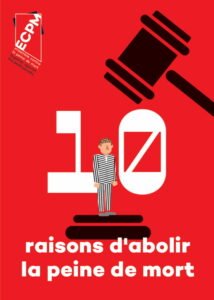
We are in favour of abolition because the death penalty is…
A tool of political repression
It is used as a tool of repression (against the population) and to exert pressure (between countries). Many countries apply it as a means of political and/or religious repression: you do not demonstrate against government policy, when simply expressing your opinion is enough to send you to the scaffold.
Traumatic
The death penalty creates new victimes. Not only do death sentences fail to provide relied to the relatives of victims of the original crime, but they also extend the suffering and trauma to the families of those sentenced to death, as well as to the jurors, lawyers, judges, etc. involved in the case.
Incompatible with rehabilitation
The death penalty is a denial of the capacity for reintegration of each and every one. A socially useful life remains possible for all prisoners. This is an important objective of justice, which should rehabilitate the perpetrators of
offences and provide reparation in order to restore balance and peace in the community.
Learn more
To better understand the issues related to the death penalty in the world, ECPM and the artist Marty Planchais have produced a video, an excerpt of which is shown below, which is also shown in classrooms during school presentations.